| Srl | Item |
| 1 |
ID:
118456
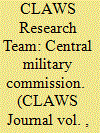

|
|
|
| 2 |
ID:
129649
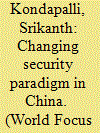

|
|
|
|
|
| Publication |
2014.
|
| Summary/Abstract |
At the third plenum of the 18th Communist Party Congress on November 9-12, 2013 China's new leadership that took over in late 2014 announced the formation of a new national security Commission, apart from re-organising the economic sector of the country. These two issues- reorganising China's policy structures into main two modularized priority entities in economic and security domains- are expected to last at least till the next decade and beyond. Indeed, these are expected to change how the security paradigm in China is to be viewed by the outside world. In early 2014, it was announced that the new leader Xi Jinping will head this commission, in addition to his duties as general secretary of the communist party, President of the republic, and Chairman of the Central Military commission.
|
|
|
|
|
|
|
|
|
|
|
|
|
|
|
|
| 3 |
ID:
114843
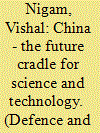

|
|
|
| 4 |
ID:
154435
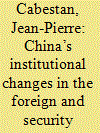

|
|
|
|
|
| Summary/Abstract |
This article focuses on the institutional changes that have occurred in the foreign and security policy realm since Xi Jinping became General Secretary of the Chinese Communist Party (CCP) in November 2012. The establishment of a National Security Commission (NSC) in November 2013, the power centralization in the Central Military Commission (CMC) and the reorganization of the CCP leadership of the People’s Liberation Army (PLA) as well as the major branches of the PLA, the reorganization in March 2013 of the various civilian maritime security agencies and the establishment in December 2013 of a Cybersecurity and Informatization Leading Small Group (LSG) are the most striking organizational reforms introduced by Xi. But other institutional changes have taken place as Xi’s inclination to rely on a larger number of actors and in particular to give his closer political allies a bigger role also in foreign and security policy. These changes have obviously helped concentrate more power in the hands of Xi Jinping and, to some extent, better coordinate domestic and external security objectives and on the whole have well served China’s foreign and security policy’s assertiveness and initiatives. However, these changes have only partly reduced the power fragmentation that has developed extensively under Hu Jintao, and they have not contributed to institutionalizing decision-making processes at the top of the CCP and the state apparatuses. On the contrary, it appears that through these changes Xi has not only created new bureaucratic overlaps and tensions but also, in relying more on his own advisers, fed frustrations and competitions among agencies and officials, in other words, new forms of power fragmentation.
|
|
|
|
|
|
|
|
|
|
|
|
|
|
|
|
| 5 |
ID:
114840
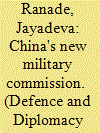

|
|
|
| 6 |
ID:
129263
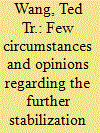

|
|
|
|
|
| Publication |
2012.
|
| Summary/Abstract |
Speech made by Comrade Jiang Zemin at a symposium held during the Sixth Plenary Meeting of the Thirteenth Chinese Party Congress. Today we invite comrades from ethnic border regions and from the Shenyang, Beijing, Lanzhou, and Chengdu military districts who are participating in the present central (committee) plenary meeting to attend a symposium, and we also invite comrades from the various de- partments of the Party Center and the relevant state council departments participating in the plenary meeting to attend in order to study the matter of further stabilizing the ethnic border regions. This indicates that the Party Center, the state council, and the Central Military Commission show great concern for and attach importance to the work in the ethnic border regions
|
|
|
|
|
|
|
|
|
|
|
|
|
|
|
|
| 7 |
ID:
064396
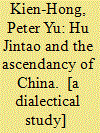

|
|
|
|
|
| Publication |
London, Marshall Cavendish Academic, 2005.
|
| Description |
240p.pbk
|
| Standard Number |
9812104232
|
|
|
|
|
|
|
|
|
|
|
|
Copies: C:1/I:0,R:0,Q:0
Circulation
| Accession# | Call# | Current Location | Status | Policy | Location |
| 049871 | 951.05/KIE 049871 | Main | On Shelf | General | |
|
|
|
|
| 8 |
ID:
122154
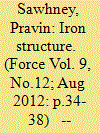

|
|
|
| 9 |
ID:
118680
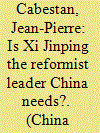

|
|
|
|
|
| Publication |
2012.
|
| Summary/Abstract |
In autumn 2012, following the 18th Congress of the Chinese Communist Party (CCP), Xi Jinping is to succeed Hu Jintao as General Secretary of the Party and also, in all probability, as Chairman of the Central Military Commission, where he has been second-in-command since 2010. In March 2013, he is set to become President of the People's Republic of China. Born into the political elite, he enjoys a great deal of support in the Nomenklatura. Having governed several coastal provinces, the current Vice-President is thoroughly acquainted with the workings of Party and state. He also has support within the Army, where he spent a short time at the beginning of his career. In addition, in recent years, he has acquired significant international experience. Urbane and affable, Xi is appreciated for his consensual approach. Nonetheless, Xi is taking charge of the country at a particularly delicate time. China is having to adopt an alternative growth model whilst the government is struggling with powerful economic and regional feudalities. The Bo Xilai affair has highlighted the weakening of the central government, the corruption of the elites, and deep-rooted ideological differences within the Party machine that are damaging the political legitimacy of the regime and endangering its stability. As a result, Xi must not onlyreunify the Party leadership and machine but also establish his authority over all the country's civil and military institutions. His style and charisma will help him. But his success will also and above all depend on his ability to form a united coalition set on reform and capable of dismantling the privileges acquired by the regime's many bosses. The CCP needs a leader who is both strong and courageous. Is Xi such a man? Perhaps.
|
|
|
|
|
|
|
|
|
|
|
|
|
|
|
|
| 10 |
ID:
137439
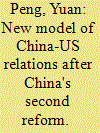

|
|
|
| 11 |
ID:
119338
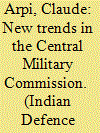

|
|
|
| 12 |
ID:
129979
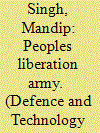

|
|
|
| 13 |
ID:
128272
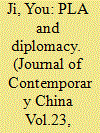

|
|
|
|
|
| Publication |
2014.
|
| Summary/Abstract |
The PLA's role in Beijing's foreign policy-making process is a closed book but it is a key research topic in our study of Chinese diplomacy. This paper argues that generally the PLA abides by a fine division of labor with the Ministry of Foreign Affairs (MoFA) in managing Beijing's international pursuits. The civilians are in charge of China's generic foreign affairs and daily diplomacy. The Central Military Commission (CMC) is responsible for security/military-related foreign affairs and defines the bottom-line for employing force in conflicts. Institutionally the PLA's role is more directional than detailed and is often behind the scenes. This complicates our research of the subject matter, as the line between this division of labor is thin over many diplomatic issues. Often times it is hard to demarcate where Beijing's normal diplomacy ends and where security/military dynamics begin. This paper adopts a two-layered analysis on civil-military interaction on foreign and security affairs: the broad consensus of CCP-PLA leaders on CCP regime stability at a time of drastic domestic change and world pressure; and the PLA's directional role in China's security/military-related foreign affairs under a generic civilian guidance.
|
|
|
|
|
|
|
|
|
|
|
|
|
|
|
|
| 14 |
ID:
121655
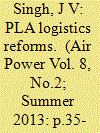

|
|
|
| 15 |
ID:
169148
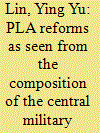

|
|
|
|
|
| Summary/Abstract |
Following the most recent round of military reforms launched in 2016, the People’s
Liberation Army (PLA), from the highest to the lowest echelons, has been moving
in the direction dictated by President Xi Jinping. The major concern of the PLA,
however, is the membership of the Central Military Commission (CMC). The
list of candidates for the CMC of the 19th National Congress of the Communist
Party of China (CPC) was not decided until the first plenary session of the Central
Committee of the CPC after the 19th National Congress. The CMC retains its one
chairman and two vice chairmen leadership structure, but only the chiefs of the
Joint Staff Department and Political Work Department, the Minister of National
Defense and the head of the Commission for Discipline Inspection are granted
a seat in the CMC. As compared with the 18th CMC, the 19th CMC has fewer
members. The decrease in the number of CMC members represents a change in
the command structure of the PLA. From a hierarchical perspective, each level of
command has its political and professional significance, also tasked with different
missions. All levels work together to manage the PLA, the world’s largest military
force. From the change in the composition of the CMC, the selection of candidates
for CMC membership, the qualifications of the candidates in terms of grade and
rank, and their functions, this study seeks to find out the impact of the 19th CMC
members and newly-appointed theater commands’ and the services’ commanding
generals and admirals on the PLA reforms as well as the implications thereof.
|
|
|
|
|
|
|
|
|
|
|
|
|
|
|
|
| 16 |
ID:
053934
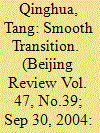

|
|
|
| 17 |
ID:
135518
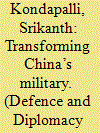

|
|
|
|
|
| Summary/Abstract |
In the last few years, China has been making concerted efforts at formulating and implementing a comprehensive strategy aimed at a successful power transition at the global and regional levels. in conjunction with its status as the second largest economy in the world and the largest trading partner with many an advanced country, China has recently been implementing a strategy of comprehensive military transformation to aid its leadership ambitions. Learning from the United States armed forces’ experience in Iraq, Kosovo and Afghanistan, China has been implementing a strategy of “system of system” transformation of its armed forces. This effort, with mixes result, is leading to spirals of tension in the region.
|
|
|
|
|
|
|
|
|
|
|
|
|
|
|
|
| 18 |
ID:
114850
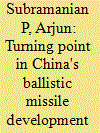

|
|
|
| 19 |
ID:
118494
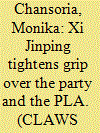

|
|
|
| 20 |
ID:
187127
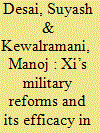

|
|
|
|
|
| Summary/Abstract |
Chinese President Xi Jinping announced landmark military reforms in late 2015. The reforms intend to remove the ‘institutional obstacles, structural contradictions and policy problems’ with the aim of modernising the People’s Liberation Army’s (PLA) organisational structure in order to ‘further unleash its combat effectiveness’. They also aim to convert the PLA into a world-class force by 2049. However, assessing the reform process in the context of organisational structures and force-specific objectives, it appears that there remains much to be desired. The reforms have certainly made the PLA a better equipped regional force. But they have, thus far, only had a limited impact in terms of preparing the PLA to meet key strategic and security objectives.
|
|
|
|
|
|
|
|
|
|
|
|
|
|
|
|